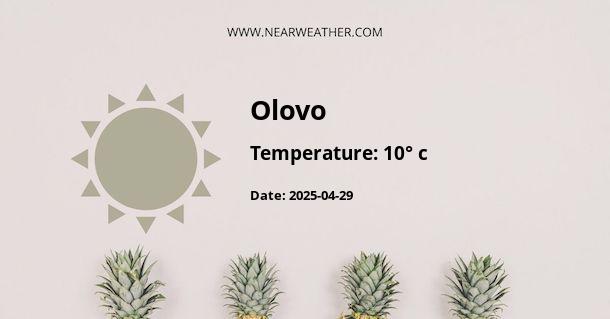The Climate and Weather of Olovo, Bosnia and Herzegovina
Olovo, a charming town in Bosnia and Herzegovina, experiences a continental climate largely shaped by its geographical setting in the Balkan Peninsula. To understand the climate and weather patterns of Olovo throughout the year, it is essential to dive into a detailed examination of its seasonal variations, temperature fluctuations, precipitation levels, and other meteorological phenomena.
Geographical Influence on Olovo's Climate
The town of Olovo is situated within the mountainous region of Bosnia and Herzegovina, which imparts a significant influence on its climate. Surrounded by the lush hills of the Dinaric Alps, Olovo's elevation and topography create microclimates that can cause weather conditions to vary even within short distances.
Seasonal Climate Overview
Spring
Spring in Olovo begins in March and extends through May. This season is characterized by a gradual increase in temperatures and a significant reduction in snowfall as compared to the winter months.
- Temperature: Daily maximums range from 8°C in early spring to around 20°C by the end of May. Nighttime temperatures can still dip below freezing in early spring.
- Precipitation: Rainfall increases as the season progresses, with an average of 80 to 100 mm per month.
- Notable Weather Events: Occasional late snowfall or frost events can still occur in the early part of the season.
Summer
Summer, spanning from June through August, is the warmest and often the most pleasing season in Olovo.
- Temperature: Average highs are between 22°C and 26°C, with occasional peaks above 30°C during heatwaves. Nights are considerably cooler, providing a respite from daytime heat.
- Precipitation: Summer is also the wettest season, with thunderstorms being a common occurrence. The average monthly rainfall ranges from 90 to 120 mm.
- Notable Weather Events: The possibility of severe thunderstorms and occasional flash floods due to heavy rains can occur during this season.
Autumn
Autumn arrives in September and heralds a period of cooling temperatures and colorful foliage, lasting until November.
- Temperature: Temperatures gradually decrease from an average high of 20°C in September to around 8°C in November. Frost becomes increasingly common towards the end of the season.
- Precipitation: Rainfall is relatively high in early autumn but decreases as the season progresses. Average monthly precipitation is between 70 and 90 mm.
- Notable Weather Events: Early snowfall can sometimes be seen as early as November.
Winter
Winter, from December through February, is the coldest season with snow-covered landscapes being a common sight.
- Temperature: Average highs hover around 1°C, with lows often dropping to -5°C or lower. The cold can be more severe due to wind chill factors.
- Precipitation: Snowfall is frequent, contributing to the overall precipitation which averages 80 mm per month.
- Notable Weather Events: Severe cold snaps and heavy snowstorms can cause travel disruptions during this period.
Weather Patterns and Trends
It is noted that the global climate change impacts weather patterns everywhere and Olovo is no exception. Over the past decades, there have been observations of shifts in temperature averages and precipitation patterns, suggesting a trend towards warmer temperatures and alterations in seasonal weather behaviours.
"Climate change does not respect border; it does not respect who you are - rich and poor, small and big. Therefore, this is what we call 'global challenges,' which require global solidarity." - Ban Ki-moon
Temperature and Precipitation Charts
Annual temperature and precipitation charts for Olovo typically exhibit the following patterns:
| Month | Average High (°C) | Average Low (°C) | Precipitation (mm) |
|---|---|---|---|
| January | 1 | -5 | 80 |
| February | 3 | -3 | 76 |
| March | 8 | 0 | 78 |
| April | 14 | 4 | 90 |
| May | 20 | 9 | 92 |
| June | 22 | 11 | 101 |
| July | 26 | 13 | 98 |
| August | 26 | 12 | 85 |
| September | 20 | 9 | 90 |
| October | 14 | 4 | 86 |
| November | 8 | 0 | 96 |
| December | 2 | -3 | 87 |
Extreme Weather and Advisories
In the wake of climate variability, Olovo has experienced extreme weather events that necessitate advisories. Authorities typically issue warnings when adverse weather conditions like heavy snowfall, severe thunderstorms, or heatwaves are forecast. Residents and visitors are urged to stay informed through local news and weather channels.
Climate Adaptation and Resilience
Olovo's weather patterns are not just statistics but form the basis for crucial planning and preparation at both the individual and community levels. As the patterns of seasons shift, the need for adaptation strategies becomes more pressing. Efforts range from improving infrastructure to resist extreme weather, to educating the population about sustainability and resilience against the changing climate.
Sustainability Initiatives
Embracing sustainability is essential to mitigate climate change effects. In Olovo, initiatives to promote energy efficiency, reduce carbon footprint, and protect natural resources are gradually being implemented. These efforts help in reducing the town's vulnerability to adverse weather conditions and in promoting a more sustainable future.
Concluding Thoughts
Understanding the climate and weather patterns of Olovo, Bosnia and Herzegovina is not only vital for the safety and well-being of its residents but also serves as an insight into the broader implications of climate change on local scales. Looking ahead, Olovo's ability to adapt and respond to these changes will be a defining factor in its enduring prosperity and quality of life.
A - Olovo's Latitude is 44.130001 & Longitude is 18.582781.
A - Weather in Olovo is 10° today.
A - Climate Conditions in Olovo shows few clouds today.
A - Humidity in Olovo is 94% today.
A - Wind speed in Olovo is 4.18 km/h, flowing at 111° wind direction. today.
